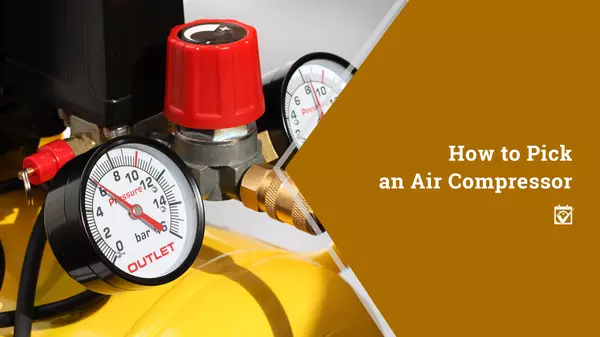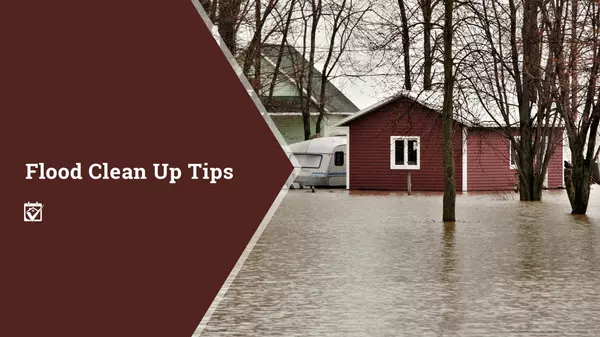
How to Pick an Air Compressor
When you own a home, it’s important to have the tools that are necessary to make little repairs, or even do major DIY if that’s your thing. One of the most useful tools you can add to your collection is an air compressor. An air compressor can do so many things around the house, from helping you keep screens and vents debris-free, to airing up car tires and other inflatables, and even powering a whole collection of useful tools. But how do you pick the perfect air compressor for your projects? Don’t worry, it’s easier than you may think. First, Choose Your Air Tools Before you can really select an ideal air compressor, you need to know what you’re going to do with it. Are you going to use it to power an air nailer to help you install new trim work throughout your home? Will you just use it seasonally to blow up tires and pool toys? Knowing what you plan to do with your air compressor can help you choose an air compressor that can do the work. How quickly an air compressor can supply air is measured in cubic feet per minute (cfm) and different tools use air at different rates. Paint sprayers, for example, will use a lot more air than a pneumatic nail gun, so if you plan to do a lot of painting, you’ll need an air compressor that can really step up. If you’ll use more than one air-thirsty tool at once with the same compressor, that goes doubly. Consider Tank Size and Shape The size of the tank on your future air compressor does matter, but nowhere near as much as the cfm it can supply. Having a large air tank can help compensate for a lower cfm, but that won’t work if you’re using a tool that uses air most of the time, such as a sprayer. You can’t exactly stop mid-spray to wait for the tank to refill, but you certainly could take a break if you were nailing or sanding. For household use, there’s a secondary concern with tank size. Most of the tasks many homeowners will be tackling will be small jobs, and they may happen anywhere on the property. Having a smaller tank means that your unit is more portable, generally speaking (some do come with wheels), and can get into tighter spots. This can be an advantage, depending on how you’re using the air compressor. Convenience IS an Option Sometimes, you know you need tools, and you know you need an air compressor, and you find a delightful bundle of both. If you’re just doing occasional work around the house, and the bundled tools are ones you’ll actually use, it can be a great way to get into an air compressor and tool kit at a significant discount. You’ll still want to consider all the other things you may do with that air compressor in the future, to ensure it’ll be useful to you as time goes by. So you’ll need to keep in mind how much air it can hold and how much it can produce, but choosing a bundle can make the decision easier. No matter which you choose, though, always make sure to get things like an air chuck for tire inflation, because you’ll use them over and over again. Not Sure You Want the Baggage of an Air Compressor? For some homeowners, extra tools just mean extra clutter and valuable space being taken up by things you might not use all that often. It’s ok to not buy an air compressor if it doesn’t make sense with what you hope to do with your home. If you’d rather hire someone to come around and hang your trim or winterize your pool house, that’s perfectly fine. But, in that case, you’ll need a hook-up for a great air compressor owner who can get the job done right the first time. That’s where your HomeKeepr community comes in! Whether you need a carpenter, a general contractor, a handyman, or a pool expert, there are tons of professionals full of compressed air to choose between. Log in and ask your community for their recommendations to get started!

Should You Sell or Should You Remodel Your Home?
Your home, as they say, is where your heart is, and for so many homeowners, it’s a lot more than a saying. Their home is a place where they made so many memories with family and friends, and considering selling it can be extremely painful. But what do you do if your home is no longer meeting your needs? Can you simply remodel your home into the house you need? It’s a hard decision to make, to be sure, but there are some major considerations that can help you decide which is the right choice for you and your family. How Close Is Your Home to Perfect? Sometimes, the changes you need to make your home right for today are small. For example, if you’re planning on aging in place, but all the bedrooms are upstairs, you might be able to add a small bedroom suite to the back or side of your home on the main floor, depending on the layout. This would allow you to continue to stay in your home, even if trips up the stairs were increasingly infrequent as you aged. On the other hand, if your remodel is more about a totally whole new look or going from a space that’s largely compartmentalized to entirely open concept, that’s a huge change to a house that will require a considerable amount of time, effort, and money. In those cases, it’s usually better to find the house you want and sell the one you’re in. Is the Neighborhood Thriving or Sliding Down Hill? If your neighborhood is healthy and thriving, and you love everything about it, it’s definitely worth considering a remodel instead of just moving along. You never really know what you’re going to get with a new neighborhood until you live there a while, and besides, you certainly already know some people nearby. That’s a wonderful way to build community. However, neighborhoods can also deteriorate, and with them go property values, the quality of schools in the area, and sometimes even a sense of safety and security. If you’re pretty sure your neighborhood used to be a lot better and you’re not always comfortable going outside at night anymore, maybe it’s time to look for a different zip code. There’s no amount of remodeling that can fix that particular concern. Will Your Equity Buy the Home of Your Dreams? Most importantly, you have to look at the financials. Remodels can take place over years, giving you time to spread out the expense, even if your equity won’t quite cover the costs you think you may incur. So, that dream kitchen might take a little while to become reality, but it’s still possible if the rest of your house makes you happy and you’re willing to wait. On the other hand, if selling your house could get you closer to the home of your dreams with the equity you’ve secured, you can save yourself a lot of mess and stress by simply moving on to the home you really want. If you’re moving to a different part of your city, or a different area entirely, that equity can easily buy something wholly different and potentially perfect, and maybe even shrink your house payment a little bit. If You’re Still Unsure… It’s time to reach out to your HomeKeepr community. The very best bankers in your area are already there and can help you figure out how much equity you may be able to use toward that remodeling project, while the contractors and architects can price it out for you. If a meeting of the minds still can’t quite find the right solution, you can check out movers and designers for that new abode. It’s all free, and it’s really easy to get all kinds of recommendations for home pros right away! Just log in to HomeKeepr to see what’s possible.

Flood Clean Up Tips
When natural disasters hit, the effects are typically much more significant than you might first suspect. Sure, there is the immediate impact and potentially some damage resulting directly from that, but in most cases, there is also a significant amount of clean up and recovery that’s required afterward. This is especially true in instances of flooding where it can take weeks if not months or longer to get everything dried out and cleaned up. So what should you do if your home is hit by flood waters? There are a lot of potential answers to this question, depending in large part on how severe the flooding was where you live. After all, getting some water in your house or basement is a much different situation than heavy flooding that damaged your foundation or broke windows and damaged walls. Assuming your home didn’t receive significant structural damage from the flood, here are a few suggestions to get you started with the cleanup process. Dry It Out Your first priority in dealing with flood cleanup is getting everything as dry as possible. Use pumps, buckets, wet/dry shop vacs, or other tools to remove as much water as you can, then wipe up or mop areas that still have a little bit of surface moisture on them. Set up fans to keep air moving to aid with the drying process, and open windows if possible to give water-laden air a place to go. For rooms that don’t have good ventilation, set up dehumidifiers to help remove moisture from the air. Getting as much water as possible out of your home quickly will help you avoid mold and mildew growth that is quite common after flooding. If you’ve got mud, sludge, and other debris in your home, use a shovel or similar tool to scoop it up and remove it from the house. Try to get as much of it as possible while it’s still wet, because it will be much harder to remove once it starts to dry. Getting this sort of debris out of your house as soon as possible is also important to keep unwanted smells out of your home; mud and other debris can contain fungi, mold spores, and other materials that will break down and decay, so you want to get it out quickly if you can. Keep Yourself Safe There are worse things that can come from flood waters than just bad smells, so it’s important to keep yourself and your family safe during clean up and afterward. Flood waters can contain decaying materials, raw sewage, and materials that can cause a variety of illnesses, so it’s important that you try to protect yourself with gloves, masks, and eye protection while cleaning up after a flood. You should also shower and change your clothes as soon as possible after finishing clean up each day to avoid accidental contamination after the fact. Sanitize every surface you can, and anything that can’t be sanitized should be gotten rid of if it came in contact with dirty flood waters. You should also keep in mind the fact that you don’t necessarily know what all is hiding in the debris you see in or around your home. Even if they’re not immediately obvious, objects with sharp points, jagged edges, and other potential hazards might be mixed in with everything that was deposited by the flood. Try to avoid picking up things directly unless you can confirm that it’s safe to do so, as even a small cut or other injury can introduce infection. Call for Help Don’t be afraid to call for help with your clean up and recovery. There are a number of recovery services available that can aid in cleaning up after a flood, and HomeKeepr can help you connect with services in your area. Best of all, if the flood is declared a disaster, then many of these services may be eligible for reimbursement from FEMA or other agencies. Sign up for a free HomeKeepr account today to find the cleanup and recovery services you need to get your home back in shape after a flood.
Categories
- All Blogs (118)
- Appliances (9)
- Bathroom Remodeling (8)
- Buying (11)
- Cabinet Specialists (8)
- Cleaning (12)
- Decks and Patios (9)
- Decluttering (8)
- Electrical (14)
- finance (8)
- Fireplace (8)
- Flooring (9)
- Foundation (8)
- Garage Doors (8)
- Garage Specialist (7)
- General Contracting (24)
- Handyman (9)
- Heating and Air-Conditioning (21)
- home (12)
- Home Improvement (35)
- Home Safety (12)
- Home Stagers (7)
- homedecor (11)
- house (11)
- Insulation (9)
- Insurance (11)
- Interior Decorating (17)
- interiordesign (12)
- Kitchen Remodeling (9)
- Landscaping (20)
- Lender (6)
- Mortgage (13)
- Paint (7)
- Painting (13)
- Pest Control (7)
- Plumbing (14)
- Pool (7)
- Roofing (9)
- selling (15)
- Smart Home (8)
- Windows (9)
- Winter Prep (7)
Recent Posts











